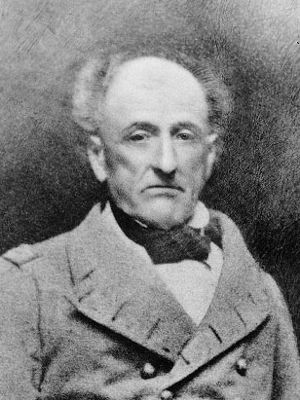

Naval History & Heritage Command photo NH 56272.
Capt. Franklin Buchanan, CSN.
He commanded sloops-of-war Vincennes and Germantown. In 1845–47, he was the first Superintendent of the United States Naval Academy. He also served with distinction in the Mexican War and commanded steam frigate Susquehanna in Oliver Hazard Perry’s expedition to Japan. Promoted captain, he served as Commandant, Washington Navy Yard, 1959–61.
In April 1862, following the outbreak of the Civil War, Captain Buchanan foresaw his native state would leave the Union and resigned his US Navy commission. When Maryland did not vote to secede, however, he sought to withdraw his resignation but instead was dismissed.
Offering his services to the Confederacy, Buchanan was commissioned captain, CSN, in September and soon assumed responsibility for defending Virginia’s James River. Under his command, Confederate ironclad Virginia destroyed frigates Cumberland and Congress at the Battle of Hampton Roads, 8 March 1962. Buchanan was wounded in that action, however, and did not participate in the battle vs. USS Monitor the following day.
Promoted admiral, CSN, in August, Buchanan was sent to defend Mobile Bay, Alabama, where he directed construction of ironclad Tennessee. Indestructible under his command at the Battle of Mobile Bay, 5 August 1864, Tennessee was eventually overwhelmed under the concentrated attack of Admiral Farragut’s entire fleet. Wounded again in this action, Buchanan was taken prisoner and, still convalescing, was exchanged the following February.
After the war, Admiral Buchanan lived primarily in Maryland and died 11 May 1874.